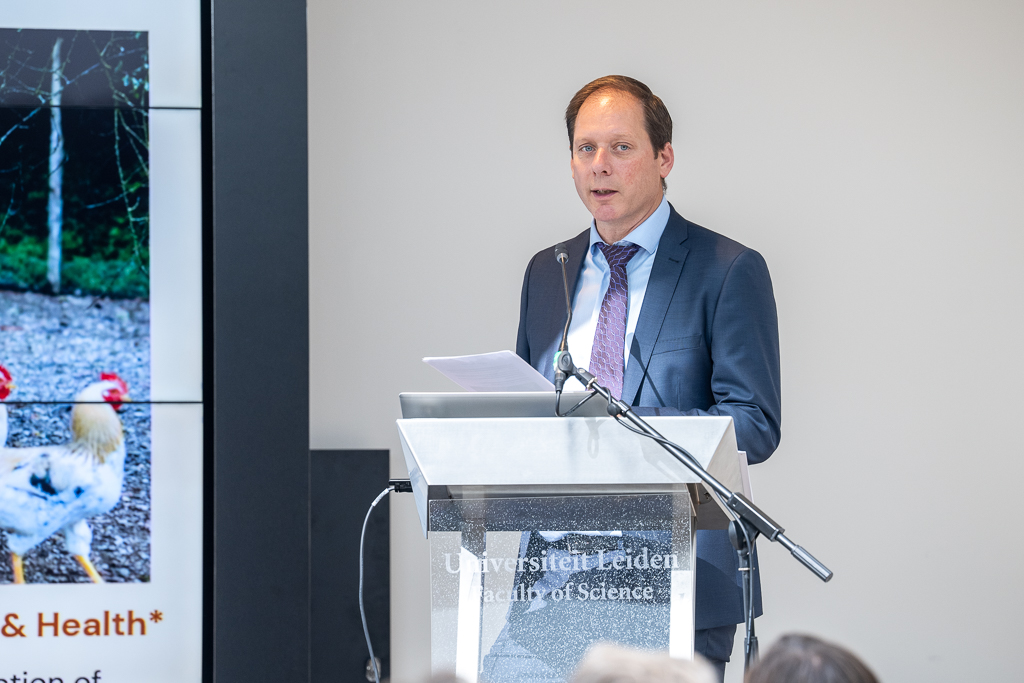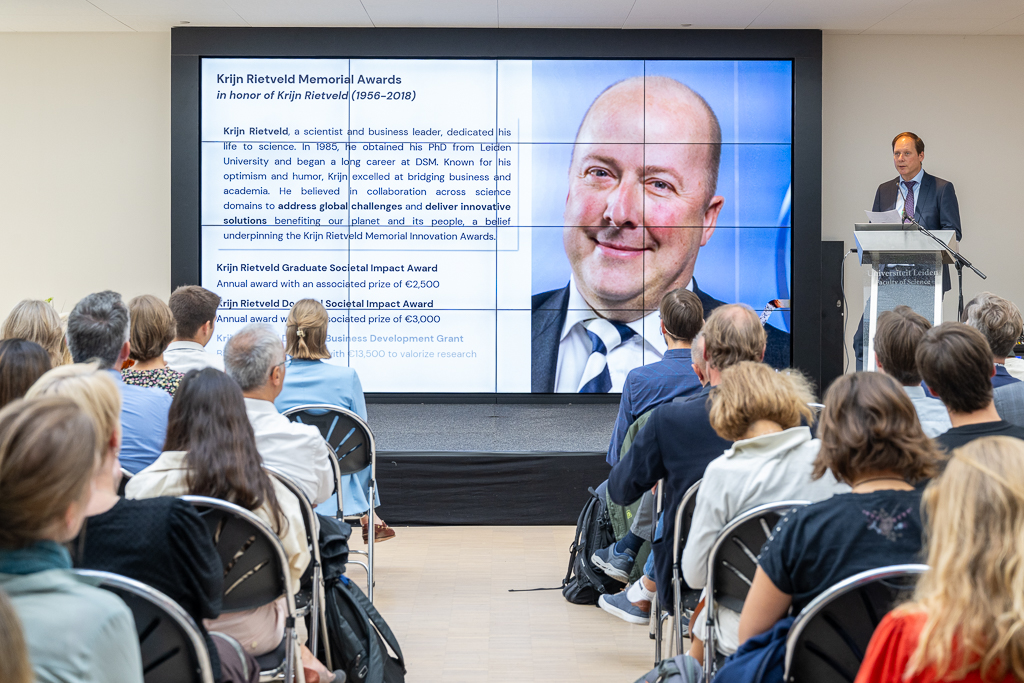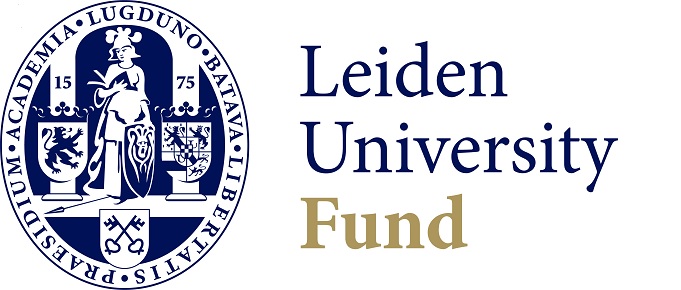
Two young researchers win Krijn Rietveld Award
One used 3D cell models to study colorectal cancer, while the other used machine learning for more efficient blood donation. For these achievements, Marieke Vinkenoog and Simon Christian Hansmann were awarded the Krijn Rietveld Memorial Innovation Award on Tuesday 2 September.
For the sixth time, the Leiden University Fund and dsm-firmenich presented the Krijn Rietveld Memorial Awards, again honouring two researchers. Marieke Vinkenoog won the Krijn Rietveld Doctoral Societal Impact Award and Simon Christian Hansmann received the Graduate Societal Impact Award. Vinkenoog: ‘Just as Krijn Rietveld, I seek collaborations that bridge different field of expertise to benefit society.’
-

Hans Roubos of dsm-firmenich speaking at the award ceremony. -

Krijn Rietveld obtained his PhD in Leiden. The awards are named after him.
More efficient blood donation using machine learning
In her dissertation, titled ‘Data-Driven Donation Strategies’, Vinkenoog created models that use past measurements to predict donors’ hemoglobin levels. Since blood donation requires a minimum hemoglobin, low-level donors are deferred for weeks. Her approach lets Sanquin invite only those likely to qualify, improving efficiency of the process. Her research was a unique collaboration between Sanquin Blood Supply and LIACS.
Her approach lets Sanquin invite only those likely to qualify, improving efficiency of the process.
‘The research bridges the gap between advanced data science techniques and practical applicants in health sciences,’ the jury says about the research of Marieke Vinkenoog. ‘These models are not only accurate but also provide clear insights into the biological factors influencing hemoglobin deferral.’
Upon hearing the news, Marieke felt honoured by the recognition. ‘It is a very double feeling, as my co-supervisor Mart Janssen passed away earlier this summer. That he is no longer there to celebrate it makes me very sad - without him, this research would never have been there either.’

Postdoc at LUMC, lecturer at LIACS
Today, Marieke balances roles as a postdoctoral researcher at LUMC and a lecturer in Statistics and Data Science at LIACS. At LUMC, she contributes to the Phaeton project on pandemic-ready predictive modeling together with TNO and RIVM, while teaching at LIACS. ‘The only downside is that I have to manage two email addresses.’
Marieke will donate part of her prize to Stichting MIND to support mental health resources for young researchers. ‘I hope to make a contribution in this way so that current and future PhD students can get the support they need to be successful and happy in their work.’
Which types of cancer cells cause relapse?
‘The presented research has significantly advanced the understanding of the molecular mechanisms that regulate cellular behaviour and tumour progression,’ the jury says about Simon Christian Hansmann’s research. ‘His work holds significant societal relevance and potential impact on personalized cancer therapies and patient recovery.’
‘I was actually still in the lab with I received the news and was very happy to be surrounded by the people that made this possible in the first place.’
For his master’s thesis, Hansmann studied how different types of colorectal cancer cells affect the chance the cancer comes back. People used to think only the most stem-like cancer cells caused relapse, but we found that more mature cancer cells can survive chemotherapy, then change back into stem-like cells and drive relapse.
Using organoids, 3D cellular models that mimic the real disease, and genetic tools, he mapped which cell types allow tumors to come back. ‘I was actually still in the lab with I received the news and was very happy to be surrounded by the people that made this possible in the first place.’

Prevent chemotherapy resistance and disease progression
Hansman now continues this research as PhD candidate with former supervisor Lars Custers at ETH Zurich, aiming to confirm these processes in mouse models and to investigate how the tumor microenvironment triggers these high-risk cell states. His goal is to pave way for new therapies that prevent chemotherapy resistance and halt disease progression.
About the Krijn Rietveld Memorial Innovation Award
In memory of Krijn Rietveld (1956 - 2018), the Leiden University Fund and dsm-firmenich established the annual Krijn Rietveld Memorial Innovation Award in 2020 to recognise innovative research for a more sustainable world. This year, two winners were chosen from nine nominees. The award ceremony took place during the Faculty of Science opening of the academic year.
Text: Manon Boot
Photography: Monique Shaw
